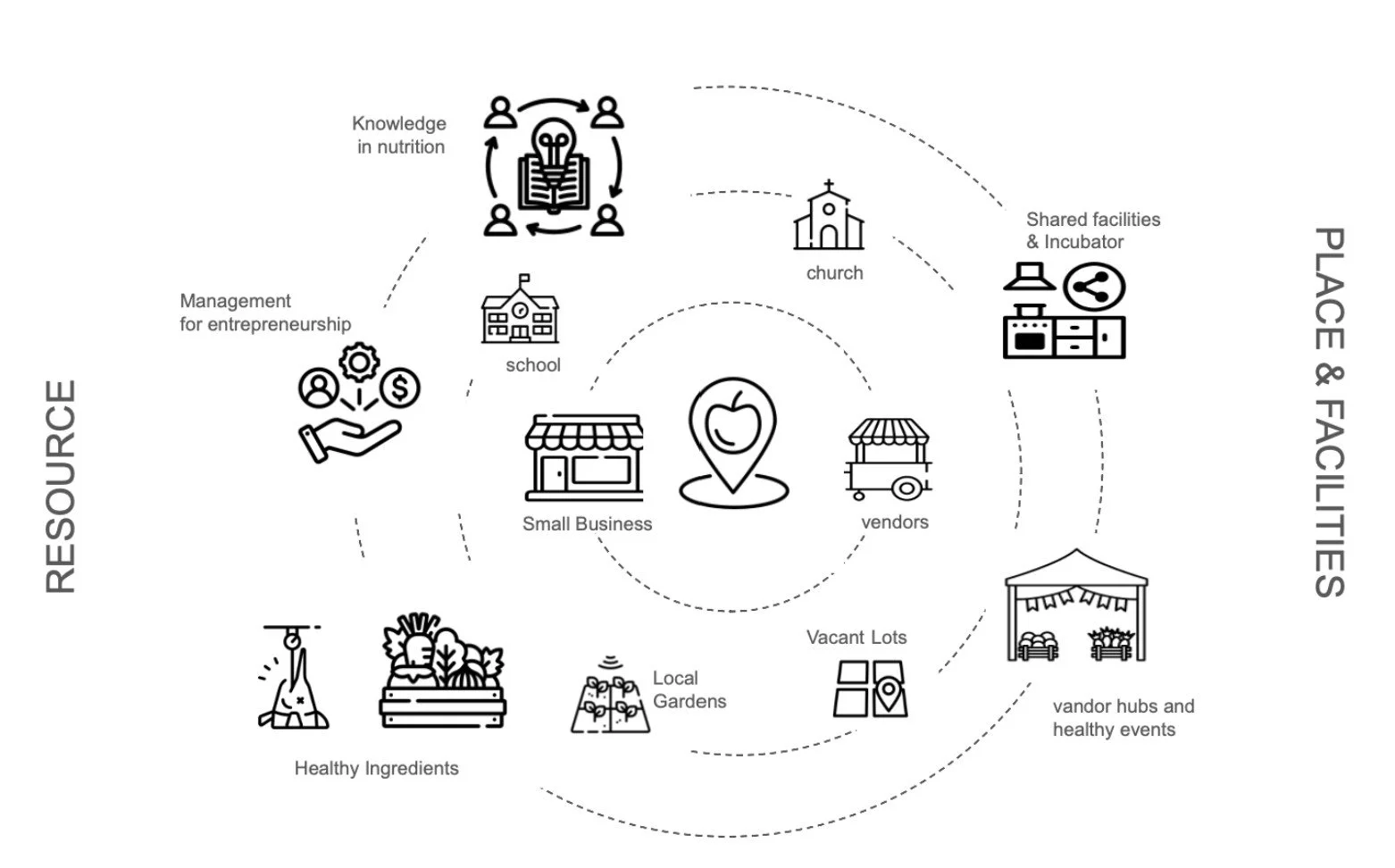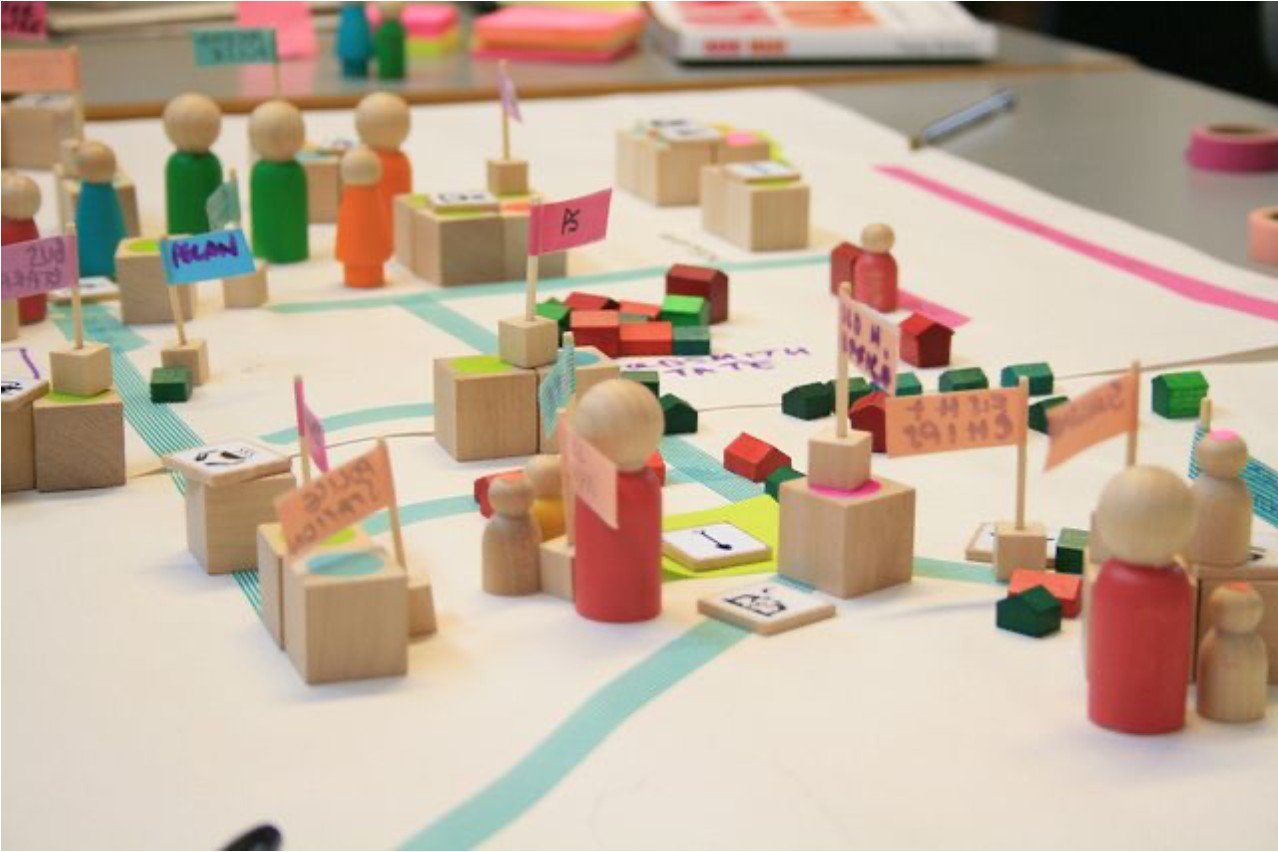Objective 6: Strengthen Neighborhood Identity and Small Business Vitality through Grassroot Placemaking
A community-centered, grassroots approach to business development and neighborhood placemaking is at the heart of a “people’s planning” process in Coney Island. By empowering small businesses through local development initiatives, and engaging residents, businesses, and other neighborhood actors in a bottom-up placemaking and neighborhood ‘branding’ initiative, these two recommendations work together to strengthen neighborhood identity and vitality in ways that distinguish ‘Coney Island’ from its popular historic significance as an entertainment and recreation destination.
6.1 Empower Small Businesses and Neighborhood Entrepreneurs through Local Development Initiatives
The Vision
This objective is designed to support local vendors and entrepreneurs by creating sustainable opportunities for small-scale businesses to flourish in Coney Island, ensuring that they have the resources, visibility, and platforms to grow and contribute to the local economy. By organizing food- and retail-related activities like markets, festivals, and pop-up events, this initiative encourages collaboration and mutual support, helping to build stronger community ties and a shared sense of purpose among residents.
In particular, food-related events offer a chance to preserve and celebrate the cultural diversity of Coney Island, building and showcasing its vibrant food scene that reflects the neighborhood’s multicultural heritage. In addition, the objective includes improving access to affordable and nutritious food, particularly in underserved areas, to tackle food insecurity and enhance residents' health. This focus on providing healthy food options also contributes to building a healthier community overall, supporting both physical well-being and community cohesion. By addressing barriers to nutrition, promoting healthy eating, and providing opportunities for local food entrepreneurs, the initiative aims to foster a more vibrant, inclusive, and sustainable environment where everyone has access to fresh, nutritious food, while celebrating the neighborhood’s rich cultural traditions. This holistic approach will enhance Coney Island’s economic and social fabric, contributing to the development of a healthy and resilient community.
Expand Access to Affordable Production and Retail Space
Co-creating to reactivate the vacant lots : involving community member in the decision-making
Temporary Use: Pop-up vendor markets, Local farmers market.
Community Events: Local events like healthy food festivals, or cultural activities
Permanent Development: Permanent vendor hubs or small business incubators.
Shared Facilities
Community Kitchen: Church, School, New permanent place
Cooking Space : Access to professional equipment
Prepping Station : More space for Ingredient Preparing
Food Safety Standard
Amenities
Public space amenities : Seating, Trash Can, Storage
Workshop and Event Space
Image Source : WEDC, Prague’s Heartland, Corona Plaza
Why it Matters
Who Should Be Involved
Local food vendors
Small Business owners
Immigrant community leaders
Residents of public an d private housing developments.
Youth groups and schools for educational programming on food sustainability.
Churches
How to Get it Done
Proposed Governance Structures:
Establish a community food coalition comprising local vendors, residents, and nonprofit representatives to oversee programs and decision-making.
Partner with local organizations like GrowNYC or other food justice groups to ensure equitable access and representation.
Utilize a transparent participatory budgeting process for allocating resources to food-related projects.
Steps to Mobilize the Community (CINRC and Allies):
Host a community forum or food festival to spark interest and generate ideas.
Collaborate with schools or community centers to create educational workshops on food entrepreneurship.
Launch a pilot program like a weekly food market to test engagement and identify key stakeholders.
Use surveys and outreach to gather feedback on food accessibility and cultural needs.
Opportunities to Align with Institutions:
GrowNYC, a nonprofit that supports environmental sustainability and food access, which could be instrumental in providing educational resources, food markets, and advocacy for local food systems and nutrition programs.
City agencies like the NYC Department of Small Business Services, which can assist with vendor permits, business development programs, and funding opportunities to support local vendors and entrepreneurs.
Nonprofits such as City Harvest and Food Bank for NYC, which can provide logistical and financial support for food distribution, as well as help with addressing food insecurity in underserved areas.
Local businesses (e.g., restaurants, grocery stores) that can participate in mentorship programs or partnerships, offering guidance and support to small vendors to help them thrive.
Resources
Local Ingredient : Private Garden, Community Garden, Rooftop Garden, School Garden
NYC Grow : Farmer’s Market
Knowledge
Nutrition Coaching : Healthy Menu, Healthy Eating
Entrepreneurship Support : Business Management
Management
Marketing and Promotion : Platform to promote, Events
Bylaws : License and Permit
Funding : Government grants, Sponsorship



